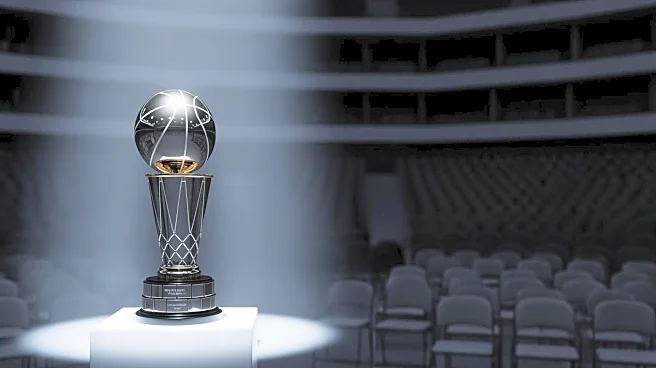What's Happening?
WNBA Commissioner Cathy Engelbert encountered a hostile reception while presenting the WNBA championship trophy to the Las Vegas Aces in Phoenix. The crowd booed Engelbert, and one attendee was seen making
an obscene gesture. The Las Vegas Aces secured their third title in four years by defeating the Phoenix Mercury. Engelbert's recent comments have sparked controversy, with allegations of dismissive remarks towards player concerns. Napheesa Collier claimed Engelbert made patronizing comments about Caitlin Clark's earnings and the media rights deal. Engelbert has denied these allegations, emphasizing Clark's positive impact on the league. The WNBA's collective bargaining agreement is set to expire on October 31.
Why It's Important?
The incident highlights tensions between WNBA leadership and players, potentially affecting league dynamics and public perception. Engelbert's alleged comments have drawn criticism from players, including Finals MVP A'ja Wilson, who expressed dissatisfaction with the commissioner's remarks. The situation underscores the importance of player-management relationships in professional sports. The upcoming expiration of the collective bargaining agreement adds urgency to resolving these issues, as it could impact negotiations and the league's future. The controversy may influence public and media attention, affecting the WNBA's reputation and fan engagement.
What's Next?
With the collective bargaining agreement nearing expiration, negotiations between the WNBA and players are likely to intensify. The league may face pressure to address player concerns and improve relations to avoid potential disruptions. Stakeholders, including players, management, and fans, will be closely monitoring developments. The outcome of these negotiations could shape the league's policies and player treatment, impacting its growth and stability. The WNBA's ability to navigate these challenges will be crucial in maintaining its momentum and expanding its audience.
Beyond the Headlines
The controversy surrounding Engelbert's comments raises broader questions about leadership and communication in sports organizations. It highlights the need for transparent and respectful dialogue between management and players. The situation also reflects ongoing challenges in women's sports, where issues of equity and representation remain prominent. The WNBA's handling of this situation could set a precedent for other leagues facing similar challenges. Additionally, the league's response may influence public perceptions of women's sports and their role in promoting inclusivity and diversity.









